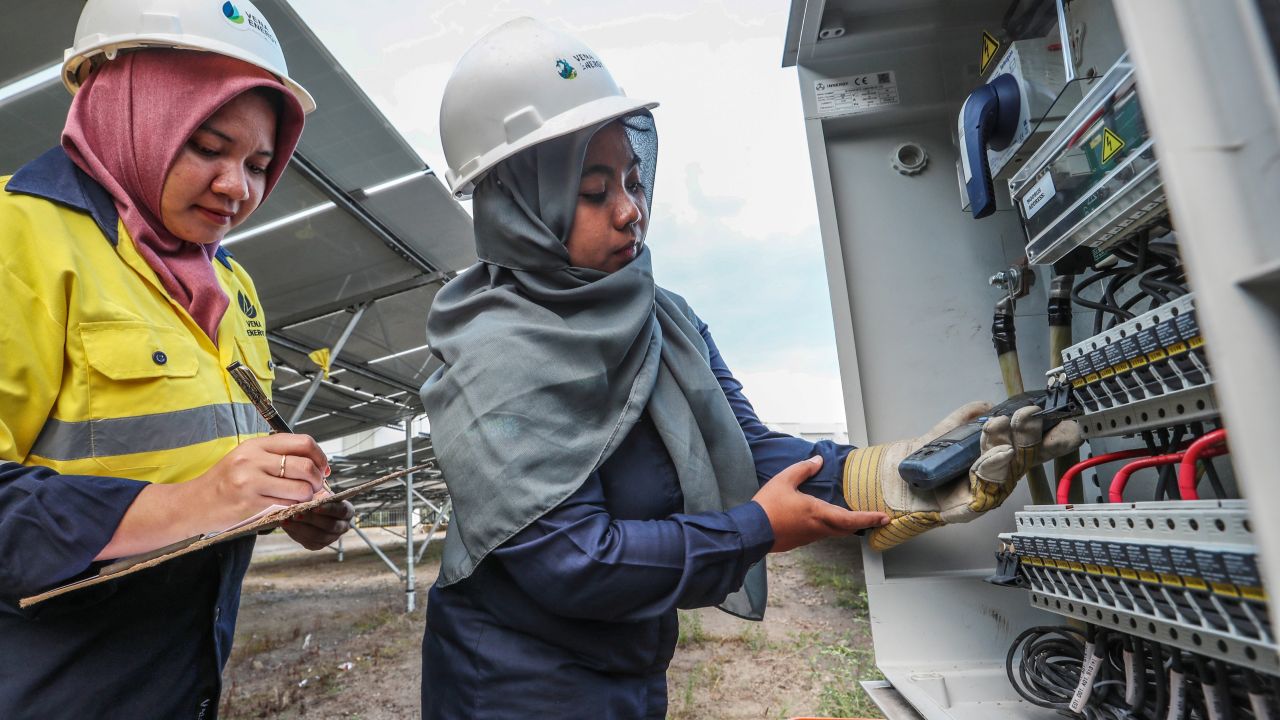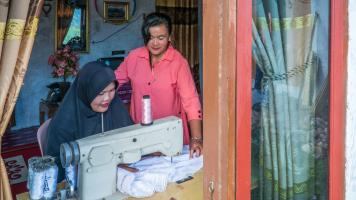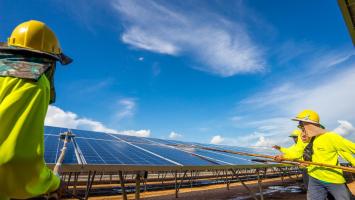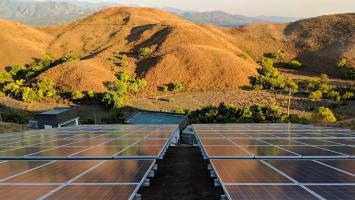
Vena Energy staff Nurul Hidayah and Fatma Mulyana perform operations and maintenance work at Selong in Lombok island, Indonesia.
A utility-scale solar project in Indonesia creates job opportunities for women as solar technicians and entrepreneurs.
A solar project in Eastern Indonesia shows how large-scale renewable projects can provide not just a stable supply of low-carbon electricity but also create co-benefits for local communities. These include developing the skills of women to help them start a business or work at a solar farm.
Singapore’s Vena Energy put up a 21-megawatt (MW) solar photovoltaic (PV) power plant in Likupang, North Sulawesi and three 7-MW solar farms in Lombok, West Nusa Tenggara. ADB, together with Leading Asia’s Private Infrastructure Fund (LEAP) and the Canadian Climate Fund for the Private Sector in Asia II (CFPS II), provided a $40.2-million financing package to support the project, which is considered the country’s first utility-scale solar PV development on a project-finance basis. All four solar power plants became fully operational in 2019 with the electricity sold to national power utility PT Perusahaan Listrik Negara (PLN) under a 20-year power purchase agreement.
High potential, low take-up
Indonesia has abundant solar power resources estimated at 532.6 gigawatts (GW). However, as of 2016, less than 1% of the country’s total potential was developed because of high up-front capital costs and high risks associated with climate uncertainties, land and right-of-way acquisition, and a low-tariff environment.
Concessional financing was needed to improve returns to overcome first-mover risks as well as address various technical and regulatory challenges. Though it already had a track record as a large independent power producer in the Asia–Pacific region, Vena Energy was new to the renewable energy market in Indonesia.
ADB also assisted the company in its first project in Eastern Indonesia, which involved constructing, operating, and maintaining a 72 MW wind power plant in Jeneponto, South Sulawesi. The wind farm was also backed by longer-term, affordable financing, and it secured a 30-year power purchase agreement with PLN.
The wind and solar power projects helped demonstrate the bankability of utility-scale renewable energy development by the private sector in Indonesia.
Enhanced sustainability
The projects added 114 MW of clean energy to Indonesia’s electricity grid and contributed to increasing the share of renewables in the energy mix and reducing emissions. According to the extended annual review report in 2023, the four solar power plants are estimated to generate 61 gigawatt-hours (GWh) per year and result in a net reduction of carbon dioxide emissions equivalent to 41,400 tons.
To meet ADB’s environmental and social requirements, Vena Energy enhanced safeguards standards, which enabled it to obtain Gold Standard Certification. This paved the way for the company’s sale of carbon credits and green bond issuance in 2020. Aside from setting electricity generation and greenhouse gas reduction targets, the project design integrated initiatives that would directly benefit local communities, particularly activities that would promote women’s economic empowerment.
Education and entrepreneurship programs
Vena Energy raised awareness on the importance of renewable energy in local schools and accommodated educational visits to the solar farms. It has offered renewable energy trainings and internships for engineering students.
Training programs targeting women included a certification course for solar farm operators and technicians. The company developed an on-the-job training program, where women received 2-day training on renewable energy and were given an opportunity for a 3-month on-the-job internship.
Fatma Mulyana was among those who joined the renewable energy course in 2018. She was hired as an operations and maintenance staff at Vena Energy’s solar farm in Sengkol, Lombok. “I registered because I was interested to learn a new skill. And because of that training, I gained new friends and got a job here at Vena Energy. I was motivated to finish the training because of the benefits of working in a good company located in my own village. It would keep me close to my family," said Fatma. “My goal is to continuously improve my skills and eventually share my knowledge with future women workers in the solar plant.”
The project also supported entrepreneurship projects of women’s groups in areas where the solar farms are located. Training activities included courses on entrepreneurship, small business accounting, food hygiene and handling, and marketing for banana chips and cassava chips ventures and hydroponic farming. The project also helped two women’s groups renovate their food production facility by providing water filters and dryer and cutting machines.
Kustina Harwati, head of the Jeger Buana Lombok women’s group, said the project helped their members, who are housewives and women who were not able to continue their education, through entrepreneurship training. The group is expanding their cassava chips business and plans to distribute their products outside of Lombok and eventually sell them abroad.


